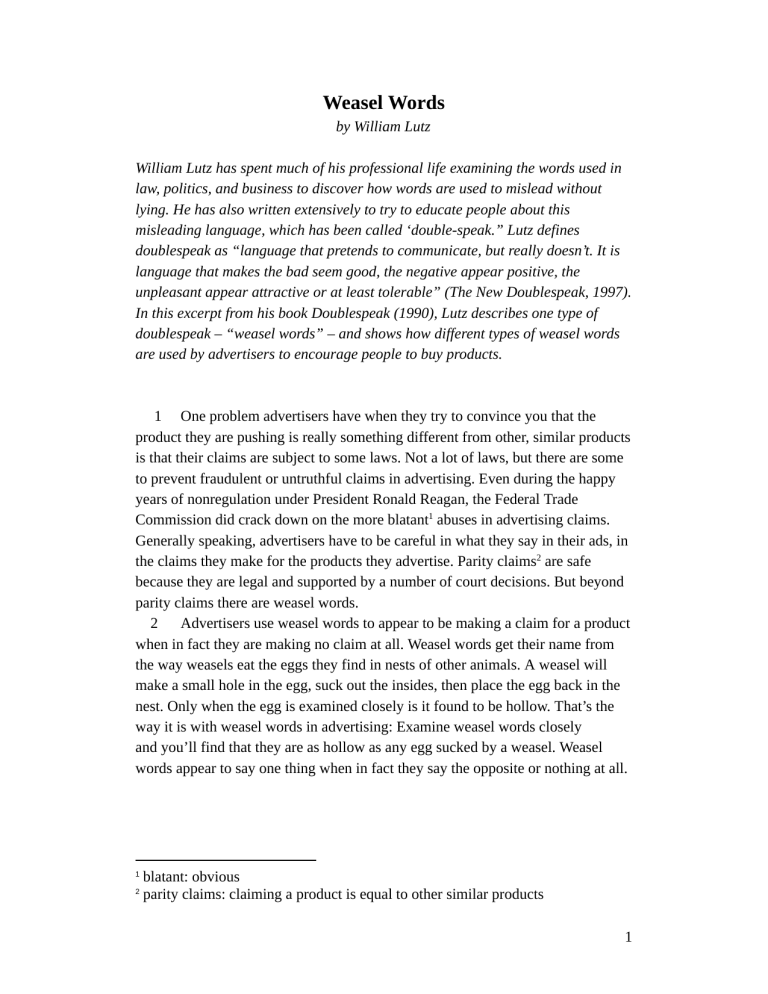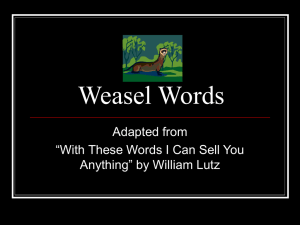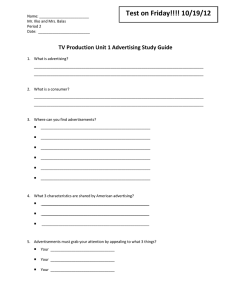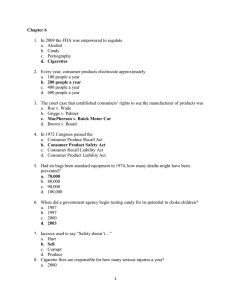
Weasel Words by William Lutz William Lutz has spent much of his professional life examining the words used in law, politics, and business to discover how words are used to mislead without lying. He has also written extensively to try to educate people about this misleading language, which has been called ‘double-speak.” Lutz defines doublespeak as “language that pretends to communicate, but really doesn’t. It is language that makes the bad seem good, the negative appear positive, the unpleasant appear attractive or at least tolerable” (The New Doublespeak, 1997). In this excerpt from his book Doublespeak (1990), Lutz describes one type of doublespeak – “weasel words” – and shows how different types of weasel words are used by advertisers to encourage people to buy products. 1 One problem advertisers have when they try to convince you that the product they are pushing is really something different from other, similar products is that their claims are subject to some laws. Not a lot of laws, but there are some to prevent fraudulent or untruthful claims in advertising. Even during the happy years of nonregulation under President Ronald Reagan, the Federal Trade Commission did crack down on the more blatant1 abuses in advertising claims. Generally speaking, advertisers have to be careful in what they say in their ads, in the claims they make for the products they advertise. Parity claims2 are safe because they are legal and supported by a number of court decisions. But beyond parity claims there are weasel words. 2 Advertisers use weasel words to appear to be making a claim for a product when in fact they are making no claim at all. Weasel words get their name from the way weasels eat the eggs they find in nests of other animals. A weasel will make a small hole in the egg, suck out the insides, then place the egg back in the nest. Only when the egg is examined closely is it found to be hollow. That’s the way it is with weasel words in advertising: Examine weasel words closely and you’ll find that they are as hollow as any egg sucked by a weasel. Weasel words appear to say one thing when in fact they say the opposite or nothing at all. 1 2 blatant: obvious parity claims: claiming a product is equal to other similar products 1 “Help” – The Number One Weasel Word 3 The biggest weasel word used in advertising doublespeak is “help.” Now, “help” only means to aid or assist, nothing more. It does not mean to conquer, stop, eliminate, end, solve, heal, cure, or anything else. But once the ad says “help,” it can say just about anything after that because “help” qualifies3 everything coming after it. The trick is that the claim that comes after the weasel words is usually so strong and so dramatic that you forget the word “help” and concentrate only on the dramatic claim. You need to read into the ad a message that the ad does not contain. More importantly, the advertiser is not responsible for the claim that you read into the ad, even though the advertiser wrote the ad so you would read the claim into it. 4 The next time you see an ad for a cold medicine that promises that it “helps relieve cold symptoms fast,” don’t rush out to buy it. Ask yourself what this claim is really saying. Remember, “helps” means only that the medicine will aid or assist. What will it aid or assist in doing? Why, “relieve” your cold “symptoms.” Relieve only means to ease, alleviate, or mitigate4, not to stop, end, or cure. Nor does the claim say how much relieving this medicine will do. Nowhere does this ad claim it will do anything at all. The ad only claims that it will aid in relieving (not curing) your cold symptoms, which are probably a runny nose, watery eyes, and a headache. In other words, this medicine probably contains a standard decongestant and some aspirin. By the way, what does “fast” mean? Ten minutes, one hour, one day? What is fast to one person can be very slow to another. Fast is another weasel word. 5 Ad claims using “help” are among the most popular ads. One says, “Helps keep you young looking,” but then a lot of things will help keep you young looking, including exercise, rest, good nutrition, and a facelift. More importantly, this ad doesn’t say the product will keep you young, only “young looking.” Someone may look young to one person and old to another. 6 A toothpaste ad says, “Helps prevent cavities,” but it doesn’t say it will actually prevent cavities. A liquid cleaner ad says, “Helps keep your home germ free,” but it doesn’t say it actually kills germs, nor does it even specify which germs it might kill. 7 “Help” is such a useful weasel word that it is often combined with other action-verb weasel words such as “fight” and “control.” Consider the claim, “Helps control dandruff symptoms with regular use.” What does it really say? It 3 4 qualifies: limits mitigate: to make less severe 2 will assist in controlling (not eliminating, stopping, ending, or curing) the symptoms of dandruff, not the cause of the dandruff or the dandruff itself. What are the symptoms of dandruff? The ad deliberately leaves that undefined, but assume that the symptoms referred to in the ad are the flaking and itching commonly associated with dandruff. But just shampooing with any shampoo will temporarily eliminate these symptoms, so this shampoo isn’t any different from any other. Finally, in order to benefit from this product, you must use it regularly. What is “regular use” – daily, weekly, hourly? Using another shampoo “regularly” will have the same effect. Nowhere does this advertising claim say this particular shampoo stops, eliminates, or cures dandruff. In fact, the claim says nothing at all, thanks to all the weasel words. 8 Look at ads in magazines and newspapers, listen to ads on radio and television, and you’ll find the word “help” in ads for all kinds of products. How often do you read or hear such phrases as “helps stop…,” “helps overcome…,” “helps eliminate…,” “helps you feel…,” or “helps you look…”? If you start looking for this weasel word in advertising, you’ll be amazed at how often it occurs. Analyze the claims in the ads using “help,” and you will discover that these ads are really saying nothing. 9 There are plenty of other weasel words used in advertising. In fact, there are so many that to list them all would fill the rest of this book. But, in order to identify the doublespeak of advertising and understand the real meaning of an ad, you have to be aware of the most popular weasel words in advertising today. Virtually Spotless 10 One of the most powerful weasel words is “virtually,” a word so innocent that most people don’t pay any attention to it when it is used in an advertising claim. But watch out. “Virtually” is used in advertising claims that appear to make specific, definite promises when there is no promise. After all, what does “virtually” mean? It means “in essence or effect, although not in fact.” Look at that definition again. “Virtually” means not in fact. It does not mean “almost” or “just about the same as,” or anything else. And before you dismiss all this concern over such a small word, remember that small words can have big consequences. 11 In 1971 a federal court rendered its decision on a case brought by a woman who became pregnant while taking birth control pills. She sued the manufacturer, Eli Lilly and Company, for breach5 of warranty. The woman lost her case. Basing its ruling on a statement in the pamphlet accompanying the pills, 5 breach: violation 3 which stated that, “When taken as directed, the tablets offer virtually 100% protection,” the court ruled that there was no warranty, expressed or implied6, that the pills were absolutely effective. In its ruling, the court pointed out that, according to Webster’s Third New International Dictionary, “virtually” means “almost entirely” and clearly does not mean “absolute” (Whittington v. Eli Lilly and Company, 333 F. Supp. 98). In other words, the Eli Lilly company was really saying that its birth control pill, even when taken as directed, did not in fact provide 100 percent protection against pregnancy. But Eli Lilly didn’t want to put it that way because then many women might not have bought Eli Lilly’s birth control pills. 12 The next time you see the ad that says that this dishwasher detergent “leaves the dishes virtually spotless,” just remember how advertisers twist the meaning of the weasel word “virtually.” You can have lots of spots on your dishes after using this detergent and the ad claim will still be true, because what this claim means is that this detergent does not in fact leave your dishes spotless. Whenever you see or hear an ad claim that uses the word “virtually,” just translate that claim into its real meaning. So the television set that is “virtually trouble free,” becomes the television set that is not in fact trouble free, the “virtually foolproof operation” of any appliance becomes operation that is not in fact foolproof, and the product that “virtually never needs service” becomes the product that is not in fact service free. New and Improved 13 If “new” is the most frequently used word on a product package, “improved” is the second most frequent. In fact, the two words are almost always used together. It seems just about everything sold these days is “new and improved.” The next time you are in the supermarket, try counting the number of times you see these words on products. But you’d better do it while you’re walking down just one aisle, otherwise you’ll need a calculator to keep track of your counting. 14 Just what do these words mean? The use of the word “new” is restricted by regulations, so the advertiser just can’t use the word on a product without meeting certain requirements. For example, a product is considered new for about six months during a national advertising campaign. If the product is being advertised only in a limited test marketing area, the word can be used longer, and in some instances has been used for as long as two years. 6 implied: stated or suggested 4 15 What makes a product “new”? Some products have been around for a long time, yet every once in a while you discover that they are being advertised as “new.” Well, an advertiser can call a product new if there has been a “material functional change” in the product. What is a “material functional change,” you ask? Good question. In fact it’s such a good question it’s being asked all the time. It’s up to the manufacturer to prove that the product has undergone such a change. And if the manufacturer isn’t challenged on the claim, then there’s no one to stop it. Moreover, the change does not have to be an improvement in the product. One manufacturer added an artificial lemon scent to a cleaning product and called it “new and improved,” even though the product did not clean any better than without the lemon scent. The manufacturer defended the use of the word “new” on the grounds that the artificial scent changed the chemical formula of the product and therefore constituted a “material functional change.” 16 Which brings us to the word “improved.” When used in advertising, “improved” does not mean “made better.” It only means “changed” or “different from before.” So, if the detergent maker puts a plastic pour spout on the box of detergent, the product has been “improved,” and away we go with a whole new advertising campaign. Or, if the cereal maker adds more fruit or a different kind of fruit to the cereal, there’s an improved product. Now you know why manufacturers are constantly making little changes in their products. Whole new advertising campaigns, designed to convince you that he product has been changed for the better, are based on small changes in superficial7 aspects of a product. The next time you see an ad for an “improved” product, ask yourself what was wrong with the old one. Ask yourself just how “improved” the product is. Finally, you might want to check to see whether the “improved version costs more than the unimproved one. After all, someone has to pay for the millions of dollars spent advertising the improved product. 17 Of course, advertisers really like to run ads that claim a product is “new and improved.” While what constitutes a “new” product may be subject to some regulation, “improved” is a subjective8 judgment. A manufacturer changes the shape of its stick deodorant, but the shape doesn’t improve the function of the deodorant. That is, changing the shape doesn’t affect the deodorizing ability of the deodorant, so the manufacturer calls it “improved.” Another manufacturer adds ammonia to its liquid cleaner and calls it “new and improved.” Since adding ammonia does not affect the cleaning ability of the product, there has been a “material functional change” in the product, and the manufacturer can now call its 7 8 superficial: unimportant subjective: based on opinion rather than fact 5 cleaner “new” and “improved” as well. Now the weasel words “new and improved” are plastered all over the package and are the basis for a multi-million dollar ad campaign. But after six months the word “new” will have to go, until someone can dream up another change in the product. Perhaps it will be adding color to the liquid, or changing the shape of the package, or maybe adding a new dripless pour spout, or perhaps a ___. The “improvements” are endless, and so are the new advertising claims and campaigns. 18 “New” is just too useful and powerful a word in advertising for advertisers to pass it up easily. So they use weasel words that say “new” without really saying it. One of their favorites is “introducing,” as in, “Introducing improved Tide,” or “Introducing the stain remover.” The first is simply saying, here’s our improved soap; the second, here’s our new advertising campaign for our detergent. Another favorite is “now,” as in, “Now there’s Sinex,” which simply means that Sinex is available. Then there are phrases like “Today’s Chevrolet,” “Presenting Dristan,” and “A fresh way to start the day.” The list is really endless because advertisers are always finding new ways to say “new” without really saying it. If there is a second edition of [my] book, I’ll just call it the “new and improved” edition. Wouldn’t you rather have a “new and improved” edition of [my] book rather than a “second” edition? Acts Fast 19 “Acts” and “works” are two popular weasel words in advertising because they bring action to the product and to the advertising claim. When you see the ad for the cough syrup that “acts on the cough control center,” ask yourself what this cough syrup is claiming to do. Well, it’s just claiming to “act,” to do something, to perform an action. What is it that the cough syrup does? The ad doesn’t say. It only claims to perform an action or do something on your “cough control center”? I don’t remember learning about that part of the body in human biology class. 20 Ads that use such phrases as “acts fast,” “acts against,” “acts to prevent,” and the like are essentially saying nothing, because “act” is a word empty of any specific meaning. The ads are always careful not to specify exactly what “act” the product performs. Just because a brand of aspirin claims to “act fast” for headache relief doesn’t mean this aspirin is any better than any other aspirin. What is the “act” this aspirin performs? You’re never told. Maybe it just dissolves quickly. Since aspirin is a parity product, all aspirin is the same and therefore functions the same. 6 Works Like Anything Else 21 If you don’t find the word “acts” in an ad, you will probably find the weasel word “works.” In fact, the two words are almost interchangeable in advertising. Watch out for ads that say a product “works against,” “works like,” “works for,” or “works longer.” As with “acts,” “works” is the same meaningless verb used to make you think the product really does something, and maybe even something special or unique. But “works,” like “acts,” is basically a word empty of any special meaning. Like Magic 22 Whenever advertisers want you to stop thinking about the product and to start thinking about something bigger, better, or more attractive than the product, they use that very popular weasel word “like.” The word “like” is the advertiser’s equivalent of the magician’s use of misdirection. “Like” gets you to ignore the product and concentrate on the claim the advertiser is making about it. “For skin like peaches and cream” claims the ad for a skin cream. What is this ad really claiming? It doesn’t say this product will give you peaches-and-cream skin. There is no verb in this claim, so it doesn’t even mention using the product. How is skin ever like “peaches and cream”? Remember, ads must be read literally and exactly, according to the dictionary definition of words. (Remember “virtually” in the Eli Lilly case.) This ad is making absolutely no promise or claim whatsoever for this skin cream. If you think this cream will give you soft, smooth, youthful-looking skin, you are the one who has read the meaning into the ad. 23 The wine that claims “It’s like taking a trip to France” wants you to think about a romantic evening in Paris as you walk along the boulevard after a wonderful meal in an intimate little bistro. Of course, you don’t really believe that a wine can take you to France, but the goal of the ad is to get you to think pleasant, romantic thoughts about France and not about how the wine tastes or how expensive it might be. The little word “like” has taken you away from crushed grapes into a world of your own imaginative making. Who knows, maybe the next time you buy wine, you’ll think those pleasant thoughts when you see this brand of wine, and you’ll buy it. Or maybe you weren’t even thinking about buying wine at all, but now you might pick up a bottle the next time you’re shopping. Ah, the power of “like” in advertising. 24 How about the most famous “like” claim of all, “Winston tastes good like a cigarette should”? Ignoring the grammatical error here, you might want to know 7 what this claim is saying. Whether a cigarette tastes good or bad is a subjective judgment because what tastes good to one person may well taste horrible to another. Not everyone likes fried snails, even if they are called escargot. (De gustibus non est disputandum,9 which was probably the Roman rule for advertising as well as for defending the games in the Colosseum.) There are many people that say that all cigarettes taste terrible, other people who say only some cigarettes taste all right, and still others who say all cigarettes taste good. Who’s right? Everyone, because taste is a matter of personal judgment. 25 Moreover, note the use of the conditional “should.” The complete claim is “Winston tastes good like a cigarette should taste.” But should cigarettes taste good? Again, this is a matter of personal judgment and probably depends most on one’s experience with smoking. So the Winston ad is simply saying that Winston cigarettes are just like any other cigarette: Some people like them and some people don’t. On that statement R.J. Reynolds conducted a very successful multi-million dollar advertising campaign that helped keep Winston the number-two-selling cigarette in the United States, close behind the number one, Marlboro. CAN IT BE UP TO THE CLAIM? 26 Analyzing ads for double speak requires that you pay attention to every word in the ad and determine what each word really means. Advertisers try to wrap their claims in language that sounds concrete, specific, and objective, when in fact the language of advertising is anything but. Your job is to read carefully and listen critically. You have to look at what words really mean, not what you think they mean or what the advertiser wants you to think they mean. De gustibus non est disputandum is a Latin maxim meaning “There’s no disputing matters of taste.” 9 8


